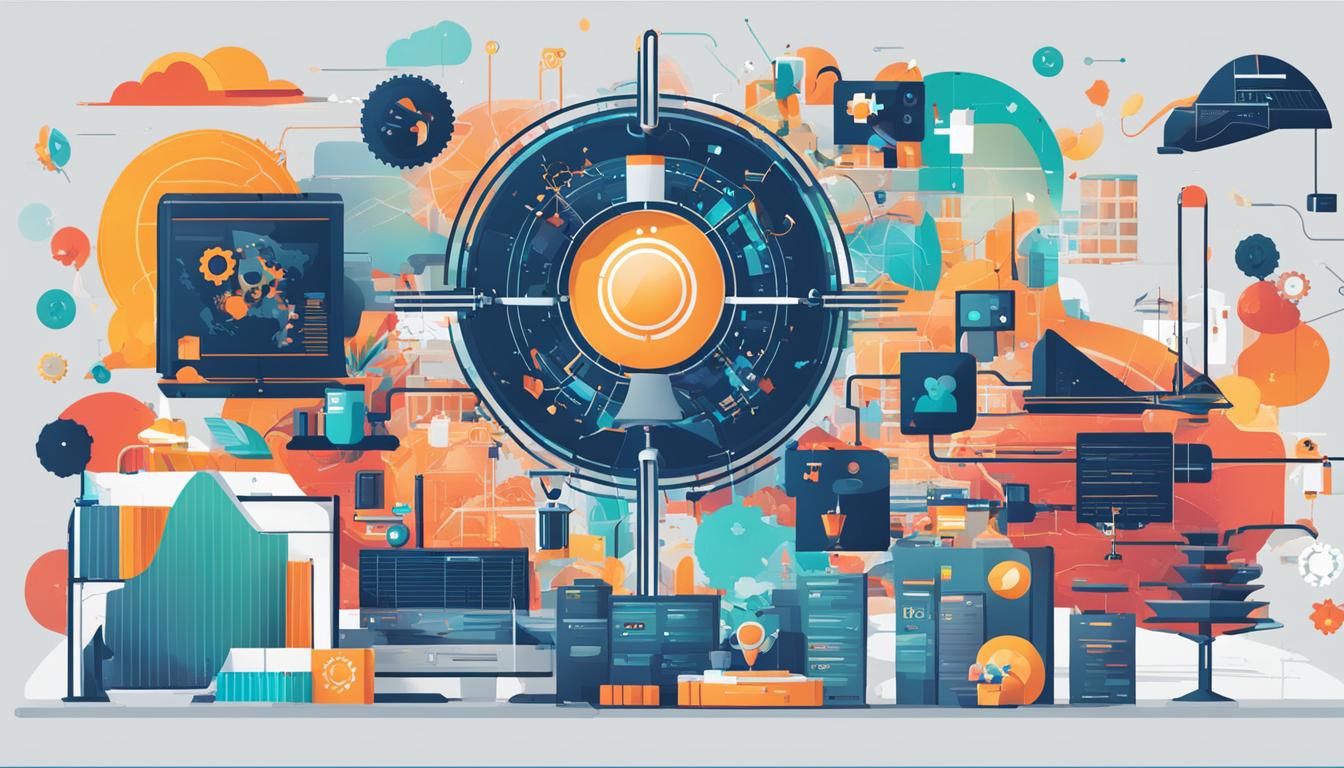Artificial Intelligence (AI) is transforming different industries and leading innovation in future businesses. It is a significant force that is influencing the future and changing the way we engage with technology. The swift progress in AI technology is creating opportunities for the growth of other emerging technologies and promoting development across various sectors.
Key Takeaways:
- AI is revolutionizing industries and driving innovation in tomorrow’s world.
- The rapid advancements in AI technology are paving the way for progress in other emerging technologies.
- AI has the power to transform the way we work and interact with technology.
- Industries such as healthcare, education, and manufacturing are being transformed by AI.
- Early adoption and collaboration with AI can lead to adaptability, innovation, and competitive advantage.
Advancements in AI and the Pace of Evolution
Artificial Intelligence (AI) is rapidly evolving, with continuous advancements being made in various areas. One notable development is in generative AI, which refers to AI systems that can generate new content, such as images, music, and text. Generative AI has the ability to create original and creative outputs that were previously only possible for humans to produce.
Generative AI is transforming the way we approach creative tasks and is opening up new possibilities for innovation and automation. It has the potential to revolutionize industries such as entertainment, design, and marketing.
While human-level AI capabilities are still being developed and are not yet fully realized, we are witnessing the automation of short-term tasks. AI is already being used to automate routine and repetitive tasks in various industries, freeing up human resources to focus on more complex and strategic work. This short-term automation is a stepping stone towards achieving human-level AI in the future.
The pace of AI’s evolution is significant and happens on a years-long scale. It indicates that substantial transformation is happening quickly. As AI continues to advance, it has the potential to impact decision-making processes, collaborative efforts, and even automate higher education-level tasks. The possibilities are vast and exciting as AI becomes more integrated into our daily lives and industries.
Advancements in AI and the Pace of Evolution
| Advancements | Impact |
|---|---|
| Generative AI | Transforming creative industries and enabling new possibilities for innovation and automation. |
| Short-term automation | Automating routine tasks, freeing up human resources for more strategic work. |
| Pace of evolution | Rapid advancements happening on a years-long scale, indicating significant transformation. |
| Potential impact | Affecting decision-making processes, collaborative efforts, and automation of higher education-level tasks. |
The Role of Analytics in AI Automation
Analytics plays a crucial role in the automation of Artificial Intelligence (AI) systems. By utilizing computed data obtained through analytics, AI systems are able to comprehend information, make informed decisions, and automate various tasks. Through the use of machine learning models and intricate algorithms, AI systems can analyze patterns, extract valuable insights, automate complex tasks, and refine operations.
One of the key functions of analytics in AI automation is enabling the system to understand and work with large volumes of data. By applying advanced analytics techniques, AI systems can process and interpret data more effectively, leading to improved decision-making and automation capabilities. This allows businesses and organizations to extract meaningful insights from their data, optimize processes, and drive efficiency.
In addition, analytics enables AI systems to continuously learn and adapt. By constantly analyzing and evaluating data, AI models can improve their performance over time. This iterative process helps to refine automation capabilities, enhance accuracy, and optimize outcomes. Through the combination of analytics and AI, organizations can leverage data-driven insights to drive innovation, improve operational efficiency, and gain a competitive advantage in their respective industries.
The Benefits of Analytics in AI Automation
The integration of analytics and AI automation brings numerous benefits to businesses and industries. Some of the key advantages include:
- Efficiency: Analytics-driven AI automation streamlines processes, reduces manual effort, and improves operational efficiency.
- Informed Decision-Making: By leveraging analytics, AI systems can make data-driven decisions, leading to more accurate and informed choices.
- Predictive Capabilities: Analytics enables AI models to identify trends, patterns, and anomalies, allowing organizations to anticipate future events and take proactive measures.
- Optimized Resource Allocation: By automating tasks through AI, organizations can allocate resources more effectively, optimizing productivity and reducing costs.
- Improved Customer Experience: AI automation supported by analytics enables personalized and tailored experiences for customers, enhancing satisfaction and loyalty.
In conclusion, analytics plays a pivotal role in AI automation by providing the necessary insights and intelligence for systems to automate tasks, make informed decisions, and optimize processes. The combination of analytics and AI enables organizations to harness the power of data, improve efficiency, and drive innovation in various sectors.
| Benefits of Analytics in AI Automation |
|---|
| Efficiency |
| Informed Decision-Making |
| Predictive Capabilities |
| Optimized Resource Allocation |
| Improved Customer Experience |
Unlocking Efficiency with AI Automation
AI automation, powered by tools like ChatGPT and Copilot services, is transforming the way businesses and individuals work with data. These AI technologies expedite data extraction, analysis, and interpretation, allowing users to derive actionable insights more swiftly and effectively. The integration of AI and automation enhances the speed, accuracy, and efficiency of analytics outcomes, empowering professionals across diverse industries to make data-driven decisions with confidence.
AI automation has revolutionized data management and analysis, enabling organizations to unlock unprecedented levels of efficiency. Through cutting-edge AI technologies such as ChatGPT and Copilot services, businesses can expedite key processes like data extraction, analysis, and interpretation. These tools leverage the power of advanced machine learning algorithms to streamline workflows, saving valuable time and resources.
With AI automation, tasks that traditionally required significant manual effort can now be performed with higher speed and accuracy. Data extraction, which used to be a labor-intensive process, can now be automated, allowing professionals to quickly gather and organize data from various sources. AI-powered analytics tools then leverage this extracted data to provide in-depth analysis and interpretation, enabling users to derive valuable insights and make informed decisions.
The integration of AI and automation in the data analysis process not only accelerates outcomes but also improves efficiency. By automating repetitive and time-consuming tasks, professionals can focus their energy on higher-level analysis and strategic decision-making. This not only enhances overall productivity but also ensures that professionals can leverage the full potential of their skills and expertise.
Benefits of AI Automation
AI automation brings forth numerous benefits for businesses and individuals alike:
- Increased speed: AI automation enables the rapid execution of tasks, reducing turnaround time and delivering faster results.
- Enhanced accuracy: By leveraging advanced algorithms, AI automation minimizes human error and ensures the accuracy of data analysis and interpretation.
- Improved scalability: AI automation allows businesses to handle larger volumes of data and scale their operations without compromising efficiency.
- Cost savings: By automating labor-intensive processes, businesses can reduce labor costs and allocate resources more effectively.
- Better decision-making: AI automation provides professionals with timely and accurate insights, enabling them to make data-driven decisions with confidence.
Realizing the Potential of AI Automation
To fully harness the benefits of AI automation, organizations must invest in cutting-edge AI technologies and provide adequate training to employees. This ensures that professionals can effectively utilize AI tools and extract maximum value from automated processes.
Additionally, a data-driven culture must be fostered within organizations, emphasizing the importance of leveraging AI for decision-making and innovation. By encouraging employees to embrace AI automation and empowering them with the necessary skills, businesses can optimize their operations and stay ahead of the competition in today’s fast-paced digital landscape.
AI and the Transformation of Employee Experiences
Artificial Intelligence (AI) is revolutionizing the way employees work and interact with technology, leading to enhanced productivity, personalized experiences, innovation, and collaboration. AI-powered tools and automation are streamlining various processes and freeing up professionals to focus on strategic and creative aspects of their work.
The impact of AI on productivity is significant. Tools like GitHub Copilot automate time-consuming tasks, allowing professionals to spend more time on higher-value activities. With AI, documentation, research and development, and coding become more efficient, enabling professionals to achieve more in less time. The ability to automate routine and repetitive tasks frees employees to tackle complex challenges and drive innovation in their respective fields.
Personalized experiences are another key aspect of AI’s transformation of employee experiences. Through AI algorithms, systems can tailor recommendations and suggestions to individual preferences, creating a more tailored and engaging work environment. This level of personalization not only enhances employee satisfaction but also improves overall performance and motivation.
Table: Impact of AI on Employee Experiences
| Aspect | AI Impact |
|---|---|
| Productivity | Automation of time-consuming tasks |
| Personalization | Tailored recommendations and suggestions |
| Innovation | Freedom to focus on strategic and creative aspects |
| Collaboration | Enhanced collaboration through AI-powered tools |
“AI has the potential to unlock the full potential of employees by automating repetitive tasks and providing personalized experiences, leading to increased productivity and innovation.”
Collaboration is another area where AI is transforming employee experiences. AI-powered tools and platforms facilitate seamless collaboration, allowing teams to work together more effectively. Whether it’s through AI-powered chatbots, virtual assistants, or collaborative software, AI enhances communication, information sharing, and collaboration across departments and teams.
The transformative power of AI in employee experiences is evident in various sectors. From healthcare to finance to manufacturing, AI is reshaping the way employees work and driving positive outcomes. Embracing AI as a collaborative partner rather than a threat to job security allows individuals and organizations to harness its full potential and stay ahead in today’s rapidly evolving digital landscape.
The Imperative of Early Adoption
As we delve into the realm of Artificial Intelligence (AI), it is essential to recognize the imperative of early adoption. Rather than viewing AI as a threat to jobs, it is crucial to embrace it as a collaborative partner. By fusing human creativity, critical thinking, and emotional intelligence with AI’s computational capabilities, we can unlock new possibilities and drive innovation in our respective industries.
Procrastinating on AI collaboration is counterproductive. Early adoption allows individuals and organizations to remain adaptable, innovative, and competitive in today’s rapidly evolving landscape. By harnessing the power of AI, we can streamline processes, increase efficiency, and gain a competitive advantage. The adaptability and agility fostered by early adoption enable us to stay ahead of the curve and seize emerging opportunities.
Adaptability and Innovation
AI collaboration empowers us to navigate the dynamic challenges of our digital age. The ability to adapt and incorporate AI technologies into our workflows ensures that we stay relevant and effective in an ever-changing world. By embracing AI, we can optimize our processes, automate routine tasks, and free up valuable time and resources for more strategic and creative endeavors.
Innovation lies at the heart of AI collaboration. By partnering with AI systems, we can explore new frontiers, uncover valuable insights, and drive breakthrough discoveries. The combination of human ingenuity and AI’s computational power opens doors to unprecedented advancements and solutions to complex problems.
Unleashing Competitive Advantage
Early adopters of AI collaboration gain a significant competitive advantage. By leveraging AI technologies, we can enhance decision-making processes, improve customer experiences, and drive business growth. AI-powered tools such as predictive analytics and machine learning models enable us to analyze vast amounts of data, derive actionable insights, and make data-driven decisions with precision.
Furthermore, AI collaboration fuels creativity and empowers professionals to explore uncharted territories. By automating repetitive tasks, AI frees up time for strategic thinking, problem-solving, and fostering innovation. The fusion of human and machine capabilities creates a powerful synergy that propels organizations forward, enabling them to stay ahead of the competition and make a lasting impact in their industries.
https://www.youtube.com/watch?v=_UynMSdwMQs
Summary:
- Embracing AI as a collaborative partner is crucial for driving innovation and unlocking new possibilities.
- Early adoption of AI collaboration allows individuals and organizations to remain adaptable, innovative, and competitive.
- AI collaboration fosters adaptability and innovation, enabling us to optimize processes and uncover breakthrough discoveries.
- By leveraging AI technologies, early adopters gain a significant competitive advantage and drive business growth.
The Rapidly Changing Landscape of AI
The future of AI is evolving at a remarkable pace, driven by technological advancements and the exponential growth of data. As we look ahead, it is clear that AI is becoming increasingly accessible and versatile, with applications spanning multiple disciplines. From healthcare to finance, from transportation to entertainment, AI is transforming industries and reshaping the way we live and work.
The data explosion has played a significant role in fueling the rapid evolution of AI. The ability to manage and interpret vast amounts of data is a key aspect of generative AI, which enables the generation of actionable insights and drives progress in various sectors. Interdisciplinary applications of AI are on the rise, with researchers and professionals from diverse fields harnessing the power of AI to tackle complex challenges and drive innovation.
“AI is transforming industries and reshaping the way we live and work.”
Technological advancements continue to push the boundaries of AI capabilities. Machine learning algorithms are becoming more sophisticated, enabling AI systems to analyze patterns, predict outcomes, and make informed decisions. This opens up a world of possibilities for automation, optimization, and efficiency across industries. From autonomous vehicles to personalized healthcare, the potential for AI to revolutionize our lives is vast.
The Impact of Interdisciplinary Collaboration
Interdisciplinary collaboration plays a crucial role in the rapidly changing landscape of AI. The fusion of expertise from different fields, such as computer science, data analytics, and psychology, allows for a holistic approach to AI research and development. By combining insights and knowledge from diverse disciplines, we can unlock new perspectives, uncover innovative solutions, and address complex challenges.
In conclusion, the future of AI is filled with immense potential and endless possibilities. As technology continues to advance and data continues to grow exponentially, we must adapt and embrace the transformative power of AI. By staying abreast of the latest advancements, fostering interdisciplinary collaboration, and ensuring responsible use, we can harness the full potential of AI to drive progress and shape a better future.
| Industry | Impact of AI |
|---|---|
| Healthcare | AI aids in diagnostics, drug discovery, and personalized treatment. |
| Finance | AI automates financial processes, improves risk analysis, and enhances fraud detection. |
| Transportation | AI enables the development of autonomous vehicles and optimized traffic management systems. |
| Entertainment | AI enhances content creation, recommendation systems, and personalized user experiences. |
| Manufacturing | AI-driven robotics and automation improve production processes, quality control, and predictive maintenance. |
The Evolution of AI and Its Influence on Computing
As AI continues to advance, its impact on computing has become increasingly profound. Through harnessing vast amounts of data and leveraging learned intelligence, AI enables computers to make optimal decisions and uncover groundbreaking discoveries. From sequencing RNA to modeling human speech, AI has transformed multiple domains, revolutionizing the way we approach computing.
One of the key aspects of AI’s influence on computing is its ability to harness data. With the exponential growth of data in today’s world, AI has become an essential tool for managing and interpreting this vast amount of information. By utilizing sophisticated algorithms and machine learning models, AI systems can analyze patterns and extract insights that would be impossible for humans to uncover on their own.
This ability to harness data not only drives advancements in computing but also leads to the discovery of new knowledge and opportunities. Whether it’s predicting market trends, identifying disease patterns, or optimizing complex systems, AI’s computational power combined with its data-driven approach has the potential to revolutionize the way we understand and interact with the world.
AI’s Impact on Computing: Harnessing Data for Optimal Decisions and Discoveries
AI’s influence on computing can be seen in various applications. For example, in the field of healthcare, AI-powered systems are helping in the discovery of new drugs, analyzing patient data for personalized treatment plans, and improving diagnostic accuracy. In the entertainment industry, AI is being used to create realistic virtual characters and enhance the overall user experience. In the automotive sector, AI enables the development of self-driving cars and improves traffic optimization. These are just a few examples of how AI is transforming industries and pushing the boundaries of computing.
| Industry | AI Applications |
|---|---|
| Healthcare |
|
| Entertainment |
|
| Automotive |
|
As AI continues to evolve, its influence on computing will only grow stronger. The advancements in AI technology, combined with the increasing availability of data, offer immense possibilities for innovation and discovery. By harnessing the power of AI, we can unlock new insights, make more informed decisions, and pave the way for a future where computational intelligence and human potential work hand in hand.

The Evolution of AI and Its Influence on Computing
As AI continues to advance, its impact on computing has become increasingly profound. Through harnessing vast amounts of data and leveraging learned intelligence, AI enables computers to make optimal decisions and uncover groundbreaking discoveries. From sequencing RNA to modeling human speech, AI has transformed multiple domains, revolutionizing the way we approach computing.
One of the key aspects of AI’s influence on computing is its ability to harness data. With the exponential growth of data in today’s world, AI has become an essential tool for managing and interpreting this vast amount of information. By utilizing sophisticated algorithms and machine learning models, AI systems can analyze patterns and extract insights that would be impossible for humans to uncover on their own.
This ability to harness data not only drives advancements in computing but also leads to the discovery of new knowledge and opportunities. Whether it’s predicting market trends, identifying disease patterns, or optimizing complex systems, AI’s computational power combined with its data-driven approach has the potential to revolutionize the way we understand and interact with the world.
Industries Transformed by AI
Artificial Intelligence (AI) has made significant impacts on various industries, revolutionizing their operations and unlocking new possibilities. Let’s take a closer look at how AI is transforming transportation, manufacturing, healthcare, education, media, and customer service.
Transportation:
In the transportation industry, AI is driving innovation and reshaping the way we travel. Self-driving cars, enabled by AI technology, are poised to revolutionize commuting, making it safer and more efficient. AI-powered travel planners provide personalized recommendations and optimize routes, enhancing the overall travel experience.
Manufacturing:
Manufacturing processes have been greatly transformed by AI automation. AI-enabled robotic arms automate repetitive and labor-intensive tasks, increasing production efficiency and reducing human error. Predictive analysis powered by AI helps manufacturers optimize their operations, improve supply chain management, and minimize downtime.
Healthcare:
AI’s impact on the healthcare industry is profound. AI algorithms aid in disease identification, drug discovery, and patient monitoring. Machine learning models analyze medical data to provide accurate diagnoses and treatment recommendations. This technology has the potential to revolutionize healthcare delivery, improve patient outcomes, and reduce healthcare costs.
Education:
In the education sector, AI is enhancing learning experiences and personalizing education. Intelligent tutoring systems adapt to individual student needs, providing tailored instruction and feedback. AI-powered virtual assistants support teachers in administrative tasks, allowing them to focus more on instructional design and student engagement.
Media:
The media industry is no exception to AI’s transformative power. AI algorithms can analyze vast amounts of data to create personalized content recommendations for users. In journalism, AI-powered tools assist in content creation, fact-checking, and news reporting. This technology is revolutionizing the way news is consumed and produced.
Customer Service:
AI has significantly improved customer service interactions. Chatbots and virtual assistants powered by AI technology provide quick and efficient customer support around the clock. These intelligent systems can understand customer inquiries, provide relevant information, and resolve common issues, delivering enhanced customer experiences.
| Industry | AI Impact |
|---|---|
| Transportation | Revolutionizing travel with self-driving cars and AI travel planners |
| Manufacturing | Automating processes with AI-enabled robotic arms and predictive analysis |
| Healthcare | Assisting in disease identification, drug discovery, and patient monitoring |
| Education | Enhancing learning experiences and personalizing education with intelligent tutoring systems and virtual assistants |
| Media | Transforming content creation, journalism, and personalized content recommendations |
| Customer Service | Improving customer experiences with AI-powered chatbots and virtual assistants |
Job Displacement and the Impact on the Workforce
The rapid advancements in artificial intelligence (AI) technology have led to concerns about job displacement and the impact on the workforce. As AI continues to evolve, routine tasks are increasingly being automated, which could potentially lead to job losses in certain industries. Roles that involve data entry and analysis, content creation, customer service, and manual labor in specific sectors are particularly at risk. It is crucial for individuals and organizations to understand the changing landscape and adapt to ensure a smooth transition in the job market.
To address the potential impact of job displacement, workforce adaptation and re-skilling are essential. As automation takes over routine tasks, there will be a growing need for individuals to acquire new skills and knowledge to remain competitive in the AI-driven world. Education and training programs that focus on programming, data analytics, and other emerging fields will play a vital role in helping employees upskill and navigate the evolving job market.
“The future of work involves fusing human creativity, critical thinking, and emotional intelligence with AI’s computational capabilities.”
It is important to view AI not as a threat to jobs but as a collaborative partner. By leveraging AI technology, individuals and organizations can enhance their productivity and innovation. AI can automate repetitive tasks, allowing employees to focus on more strategic and creative aspects of their work. Collaboration between humans and machines can lead to improved outcomes and increased efficiency in various industries.
Workforce Adaptation and Re-skilling Strategies
To ensure a smooth transition in the job market, here are some strategies for workforce adaptation and re-skilling:
- Invest in lifelong learning programs to provide employees with opportunities to acquire new skills.
- Promote a culture of continuous learning and encourage employees to embrace technological advancements.
- Provide resources and support for employees to upskill and stay competitive in the evolving job market.
- Offer mentorship programs and cross-training opportunities to help employees adapt to changing roles and responsibilities.
Conclusion
The advancements in AI technology may lead to changes in the job market, with routine tasks being automated. However, by embracing AI as a collaborative partner and investing in workforce adaptation and re-skilling, we can navigate these changes and ensure a prosperous future for both individuals and organizations. It is essential to view AI as a tool that enhances human potential and productivity, rather than a threat to job security. By equipping ourselves with the necessary skills and embracing lifelong learning, we can thrive in the AI-driven world.

The Future of Generative AI
Generative AI is poised to drive innovation and automation across industries, revolutionizing our approach to solving complex problems. With its ability to generate new and creative content, Generative AI holds immense potential for innovation and advancement. By leveraging sophisticated algorithms and machine learning techniques, Generative AI has the power to transform various fields and shape the future of technology.
One of the key areas where Generative AI is driving change is automation. Through its ability to autonomously generate data, content, and models, Generative AI has the potential to automate tasks that were previously time-consuming and resource-intensive. From generating code snippets to designing artwork, Generative AI is streamlining workflows and accelerating productivity. This opens up new possibilities for innovation and allows professionals to focus on more strategic and creative aspects of their work.
However, the rapid advancement of Generative AI also raises ethical considerations. As Generative AI becomes more sophisticated, there is a need for responsible use and careful consideration of its implications. Ensuring that Generative AI systems are used ethically and in a manner that respects privacy, security, and fairness is crucial. Striking a balance between innovation and ethical considerations will be essential for the successful integration of Generative AI into our society.
| Benefits of Generative AI | Ethical Considerations |
|---|---|
| 1. Innovation and automation across industries | 1. Responsible use of Generative AI |
| 2. Streamlined workflows and increased productivity | 2. Privacy and security concerns |
| 3. Exploration of new creative possibilities | 3. Fairness and bias in generated content |
| 4. Accelerated development of new technologies | 4. Transparency and explainability of algorithms |
The future of Generative AI is filled with promise, but it is important to approach it with careful consideration. By embracing innovation, ensuring responsible use, and addressing ethical concerns, we can harness the power of Generative AI to drive positive change and shape a future where human potential is enhanced by the capabilities of artificial intelligence.
The Significance of Generative AI in the Data-Driven Era
Generative AI plays a significant role in the data-driven era, where technological advancements and a data explosion have reshaped various industries. Its interdisciplinary applications have transformed the way we analyze and utilize vast amounts of data, driving progress across multiple sectors. With its ability to generate actionable insights and predictive models, generative AI has become a powerful tool for innovation and problem-solving.
The intersection of hardware and software innovations has democratized access to generative AI, making it more accessible and accelerating its development. This has paved the way for groundbreaking applications in areas such as healthcare, entertainment and media, automotive, and retail and e-commerce. From aiding in drug discovery and personalized treatment in healthcare to reshaping content creation and user experiences in entertainment and media, generative AI is revolutionizing industries and pushing boundaries.
Generative AI empowers us to make sense of vast amounts of data, create predictive models, and drive progress across multiple disciplines.
In healthcare, generative AI enables faster and more accurate diagnosis, aids in drug discovery, and facilitates personalized treatment plans. In the entertainment and media industry, it helps to create immersive and engaging experiences for audiences, leveraging generative algorithms to generate content and optimize user experiences. In the automotive sector, generative AI plays a crucial role in the development of self-driving cars, traffic optimization, and improved safety. Retail and e-commerce benefit from generative AI through personalized marketing strategies and real-time inventory management.
In summary, generative AI is of immense significance in the data-driven era. Its ability to harness the power of data and generate insights has transformed various industries. With ongoing technological advancements and interdisciplinary applications, generative AI will continue to shape the future, driving innovation and enabling us to address complex challenges in an increasingly data-centric world.
Industries Transformed by Generative AI
Generative AI is revolutionizing various industries, including healthcare, entertainment and media, automotive, and retail and e-commerce. Its impact is far-reaching, leading to advancements and innovations that were once unimaginable.
In the healthcare sector, generative AI is playing a pivotal role in drug discovery, diagnostics, and personalized treatment. By analyzing vast amounts of data and identifying patterns, generative AI algorithms have the potential to revolutionize the development of new medications and improve patient outcomes. This technology is transforming the way healthcare professionals approach disease identification and treatment, ultimately leading to better healthcare outcomes for patients.
| Industry | Impact of Generative AI |
|---|---|
| Healthcare | Drug discovery, diagnostics, personalized treatment |
| Entertainment and Media | Content creation, user experience |
| Automotive | Self-driving cars, traffic optimization |
| Retail and E-commerce | Personalized marketing, real-time inventory management |
Entertainment and media industries are also experiencing significant transformations with the integration of generative AI. Content creation, such as video editing and production, is becoming more efficient and innovative with AI-generated tools. The user experience is being enhanced through personalized recommendations and interactive storytelling, creating a more engaging and immersive entertainment landscape.
In the automotive industry, generative AI is driving advancements in the development of autonomous vehicles and optimizing traffic flows. With the ability to process vast amounts of data and make real-time decisions, generative AI is making transportation safer, more efficient, and more sustainable. From self-driving cars to traffic management systems, generative AI is redefining mobility.
Retail and e-commerce industries are leveraging generative AI to personalize marketing efforts and optimize inventory management. AI algorithms can analyze customer behaviors and preferences to deliver targeted advertisements and recommendations, enhancing the customer experience. Real-time inventory management ensures that products are always available, minimizing stockouts and maximizing sales.
Generative AI is transforming industries across the board, and its impact is only increasing as technology continues to advance. As we embrace the potential of generative AI, we can look forward to a future where industries are optimized, innovation is accelerated, and new possibilities emerge.
Conclusion
We stand at the cusp of an exciting future, where artificial intelligence (AI) holds immense potential to transform industries and drive innovation. As we navigate this rapidly changing landscape, it is crucial to adapt and upskill our workforce to address the challenges of job displacement and ensure individuals can thrive in an AI-driven world.
Responsible use of AI is paramount in shaping a future where the benefits of this powerful technology are harnessed ethically and responsibly. By embracing collaboration between humans and machines, we can unlock new possibilities and foster innovation in various sectors.
As we move forward, it is essential that we continue to explore the significance and implications of AI technology. By understanding the potential impact of AI, we can make informed decisions, capitalize on opportunities, and address the evolving needs of our society. Together, we can shape a future where human potential is enhanced by the remarkable power of artificial intelligence.
FAQ
How is AI revolutionizing industries?
AI is driving innovation in various sectors, transforming the way we work and interact with technology.
What is the role of analytics in AI automation?
Analytics plays a central role in AI systems by enabling them to comprehend data, make knowledgeable decisions, and automate tasks.
How does AI automation expedite data analysis?
AI automation, powered by tools like ChatGPT and Copilot services, speeds up data extraction, analysis, and interpretation.
How does AI enhance the employee experience?
AI enhances productivity, personalization, and engagement by automating time-consuming tasks and freeing up professionals to focus on strategic and creative work.
Should we fear AI as a threat to jobs?
No, it is important to view AI as a collaborative partner and embrace its potential to enhance human creativity, critical thinking, and emotional intelligence.
How is AI transforming major industries?
AI is revolutionizing industries such as transportation, manufacturing, healthcare, education, media, and customer service through automation and enhanced decision-making.
What jobs are at risk due to AI advancements?
Jobs involving routine tasks like data entry, analysis, content creation, customer service, and manual labor in certain sectors may be at risk of displacement.
What is Generative AI and its significance?
Generative AI enables the generation of actionable insights and drives progress across multiple disciplines, making it crucial for innovation and automation.
What ethical considerations should be taken with Generative AI?
Responsible use and careful consideration of the broader implications of Generative AI are necessary for a successful future.
How is Generative AI transforming industries?
Generative AI is reshaping healthcare, entertainment and media, automotive, and retail and e-commerce industries through personalized treatment, content creation, self-driving cars, and real-time inventory management.
How can individuals adapt to job displacement caused by AI?
Workforce adaptation and upskilling, including education and training in programming and new skills, are essential for staying competitive in an AI-driven world.
What is the future of AI and the importance of early adoption?
The future of AI holds endless possibilities, and early adoption allows individuals and organizations to remain adaptable, innovative, and competitive in a rapidly evolving landscape.
How does AI impact computing and data management?
AI enables computers to harness massive amounts of data and use learned intelligence to make optimal decisions, discoveries, and predictions.
How can AI and humans collaborate for a better future?
Embracing AI and collaborating with machines allows for the fusion of human potential and AI’s computational capabilities, driving innovation and creating a better future.




![Preparing for the Wave of AI in Your Business: Strategies and Trends [2024] 3 Preparing for the Wave of AI in Your Business: Strategies and Trends [2024]](https://aismasher.com/wp-content/uploads/2023/12/txt2img_1817717821.jpg)






